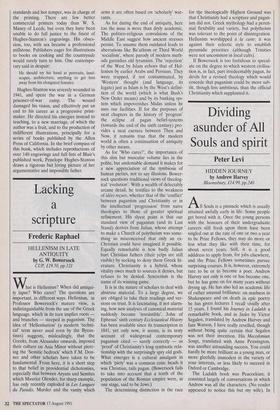Lacking a scripture
Frederic Raphael
HELLENISM IN LATE ANTIQUITY by G. W. Bowersock CUP, £19.50, pp.121 hat is Hellenism? When did antiqui- ty lapse? Who cares? The questions are important, in different ways. Hellenism, in Professor Bowersock's mature view, is indistinguishable from the use of the Greek language, which in its turn implies roots — and branches — steeped in paganism. The idea of `Hellenisation' (a modern 'techni- cal' term never used even by the Byzan- tines) suggests, misleadingly, that the Greeks, from Alexander onwards, imposed their culture on Asia Minor without pierc- ing the 'Semitic bedrock' which F.M. Don- ner and other scholars have taken to be fundamental. From here, it is a short step to that belief in providential dichotomies, especially that between Aryans and Semites which Maurice Olender, for sharp example, has only recently exploded in Les Langues du Paradis. Murder and the vanity which
arms it are often based on 'scholarly' war- rants.
As for dating the end of antiquity, here too the issue is more than dryly academic. The politico-religious convulsions of the Middle East suggest how ancient stresses persist. To assume them outdated leads to aberrations like Ba'athism or Third World 'socialism', where parody of modern meth- ods garnishes old tyrannies. The 'rejection' of the West by Islam echoes that of Hel- lenism by earlier Arabs and Persians. They were trapped, if not contaminated, by 'Western' thought (and language, its legate) just as Islam is by the West's defini- tion of the world (which is what Bush's New Order means) and by its banking sys- tem which impoverishes Midas unless he uses our facilities. If for the purposes of neat chapters in the history of 'progress' the eclipse of pagan belief-systems (towards the end of the sixth century) pro- vides a neat caesura between Then and Now, it remains true that the modern world is often a continuation of antiquity by other means.
As for 'Who cares?', the importance- of this slim but muscular volume lies in the polite, but undeniable demand it makes for a new appreciation of the symbiosis of human pieties, not to say illusions. Bower- sock questions traditional views of theolog- ical 'evolution'. With a wealth of delectably arcane detail, he testifies to the weakness of idees recites, whether that of the 'conflict' between paganism and Christianity or in the intellectual 'progression' from naive theologies to those of greater spiritual refinement. His slyest point is that our standard view of paganism (and its Last Stand) derives from Julian, whose attempt to make a Church of polytheism was some- thing so misconceived that only an ex- Christian could have imagined it possible. Equally remarkable is how badly Julian hurt Christian fathers (their yelps are still visible) by seeking to deny them Greek lit- erature. Christianity is a hybrid, whose vitality owes much to sources it denies, but refuses to be denied. Syncretism is the name of its winning game.
It is in the nature of scholars to deal with abstruse material. To a large degree, we are obliged to take their readings and ver- sions on trust. It is fascinating, if not alarm- ing, how new analyses of canonical material suddenly become 'irresistible'. John of Ephesus' sixth century Ecclesiastical History has been available since its transcription in 1841, yet only now, it seems, is its testy account of widespread contemporary paganism cited — surely correctly — as 'proof' of Christianity's long symbiotic rela- tionship with the surprisingly spry old gods. What emerges is a cultural amalgam in which 'piety' was a common coin: heads it was Christian, tails pagan. (Bowersock fails to take into account that a tenth of the population of the Roman empire were, at one stage, said to be Jews.)
The determining distinction in the race
for tbe theologically Highest Ground was that Christianity had a scripture and pagan- ism did not. Greek mythology had a peren- nial flexibility and variety, but polytheism was tolerant to the point of disintegration. Hellenists worshipped a la carte: it was against their eclectic style to establish pyramidic priorities (although Trinities were not uncommon in local cults).
If Bowersock is too fastidious to specul- ate on the degree to which western civilisa- tion is, in fact, part irredeemably pagan, he devils for a revised theology which would concede that paganism could be more sub- tle, though less ambitious, than the official Christianity which supplanted it.


















































 Previous page
Previous page